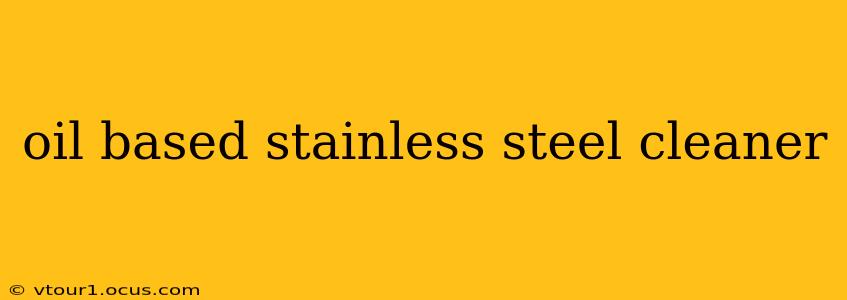Stainless steel is a ubiquitous material in kitchens, bathrooms, and industrial settings, prized for its durability and sleek appearance. Maintaining its pristine shine requires regular cleaning, and while many cleaners exist, oil-based options have garnered attention for their purported effectiveness and unique properties. This article will delve into the world of oil-based stainless steel cleaners, examining their benefits, drawbacks, and safety considerations.
What are Oil-Based Stainless Steel Cleaners?
Unlike water-based cleaners that rely on surfactants to lift dirt and grime, oil-based cleaners utilize oils (often mineral oil or other similar products) as their primary cleaning agent. These oils work by encapsulating and lifting away grease, fingerprints, and other oily residues. This method can be particularly effective at removing stubborn grime that water-based cleaners struggle to tackle. They often leave behind a protective, slightly oily film that can enhance the stainless steel's shine and resist future fingerprints.
Are Oil-Based Stainless Steel Cleaners Effective?
The effectiveness of oil-based cleaners depends heavily on the specific formulation and the type of soiling. For heavily greased surfaces or stubborn stains, oil-based cleaners often outperform their water-based counterparts. The oil's ability to dissolve grease and lift away grime makes them ideal for cleaning heavily used kitchen appliances like ranges and ovens. However, for light cleaning or simply wiping down surfaces, a water-based cleaner may suffice.
What are the Benefits of Using an Oil-Based Stainless Steel Cleaner?
- Superior Grease Removal: Oil-based cleaners excel at dissolving and lifting grease, a significant advantage in kitchen environments.
- Enhanced Shine: The residue left behind often imparts a noticeable shine and can help resist fingerprints.
- Protective Film: A thin oil layer can act as a barrier against future smudges and dirt.
- Gentler on the Finish: Some users report that oil-based cleaners are less abrasive than harsh chemical cleaners.
What are the Drawbacks of Using an Oil-Based Stainless Steel Cleaner?
- Potential for Residue Buildup: Over time, repeated use can lead to a buildup of oily residue, making surfaces appear dull or sticky. Regular cleaning with a water-based cleaner is often necessary to remove this buildup.
- Not Ideal for All Surfaces: Oil-based cleaners may not be suitable for all stainless steel surfaces, especially those with delicate finishes. Always test a small inconspicuous area first.
- Not Suitable for All Types of Soil: Oil-based cleaners are less effective on non-greasy dirt, such as food spills or dried-on substances.
- May Attract Dust: The oily residue can attract dust and other airborne particles.
How Often Should I Use an Oil-Based Stainless Steel Cleaner?
The frequency of use depends largely on how often the stainless steel surface is used. For heavily used kitchen appliances, a weekly or bi-weekly cleaning might be necessary. For less frequently used surfaces, a monthly cleaning is usually sufficient. Always remember to follow up with a light cleaning using a water-based cleaner to remove any excess oil.
Are Oil-Based Stainless Steel Cleaners Safe?
Most commercially available oil-based stainless steel cleaners are safe for use when applied as directed. However, always read the product label carefully and follow the manufacturer's instructions. Ensure proper ventilation and avoid contact with eyes or skin. For sensitive individuals, wearing gloves is recommended.
Can I Make My Own Oil-Based Stainless Steel Cleaner?
While it's possible to create a simple oil-based cleaner at home using mineral oil and a mild detergent, the effectiveness and safety may not be comparable to commercially produced cleaners. Always prioritize safety and effectiveness when choosing a cleaner.
What are the Alternatives to Oil-Based Stainless Steel Cleaners?
Water-based cleaners, often containing mild detergents and surfactants, are a common and widely available alternative. These are generally safe and effective for most types of soiling. Specialized stainless steel cleaners are also available, often formulated with specific ingredients designed to enhance shine and prevent streaking.
By understanding the benefits and drawbacks of oil-based stainless steel cleaners, you can make an informed decision about whether this type of cleaner is the right choice for your needs. Remember always to read product labels, follow instructions carefully and prioritize safety.
